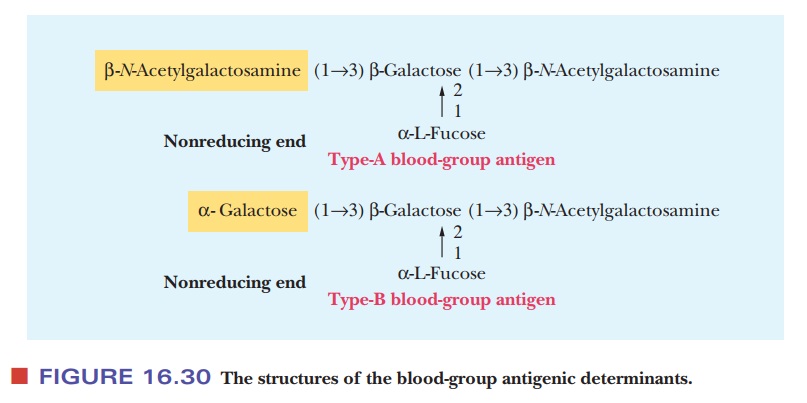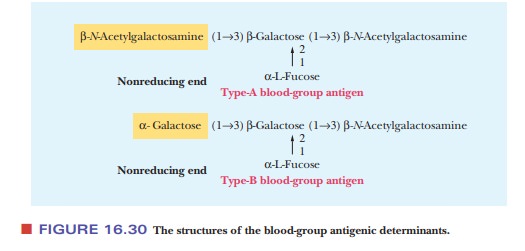Chapter: Biochemistry: Carbohydrates
Glycoproteins

Glycoproteins
Glycoproteins contain carbohydrate residues in addition to the polypeptide chain. Some of the most important examples of glycoproteins are involved in the immune response; for example, antibodies, which bind to and immobilize antigens (the substances attacking the organism), are glycoproteins.
Carbohydrates also play an important role as antigenic determinants, the portions of
an antigenic molecule that antibodies recognize and to which they bind.
How are carbohydrates important in the immune response?
An example of the role of the oligosaccharide portion of
glycoproteins as antigenic determinants is found in human blood groups. There
are four human blood groups: A, B, AB, and O. The distinctions between the
groups depend on the oligosaccharide portions of the glycoproteins on the
surfaces of the blood cells called erythrocytes. In all blood types, the
oligosaccharide portion of the molecule contains the sugar L-fucose, mentioned earlier as an example of a deoxy sugar. N-Acetylgalactosamine is found at the
nonreducing end of the oligosaccharide in the type-A blood-group antigen. In
type-B blood, α-D-galactose takes the place ofN-acetylgalactosamine.
In type-O blood, neitherof these terminal residues is present, and, in type-AB
blood, both kinds of oligosaccharide are present (Figure 16.30).

Glycoproteins also play an important role in eukaryotic cell
membranes. The sugar portions are added to the protein as it passes through the
Golgi on its way to the cell surface. Those glycoproteins with an extremely
high carbohy-drate content (85%–95% by weight) are classified as proteoglycans. (Note the similarity of
this term to the word peptidoglycan.
Proteoglycans are constantly being synthesized and broken down. If there is a
lack of the lysosomal enzymes that degrade them, proteoglycans accumulate, with
tragic consequences. One of the most striking consequences is the genetic
disease known as Hurler’s syndrome, in which the material that accumulates
includes large amounts of amino sugars. This disease leads to skeletal
deformities, severe mental retardation, and death in early childhood.
Summary
Sugars can be found in specific bonding arrangements in some
proteins.
Glycoproteins frequently play a role in the immune response.
Related Topics